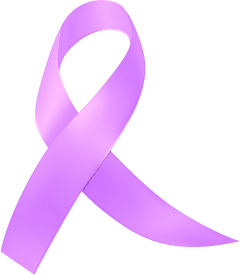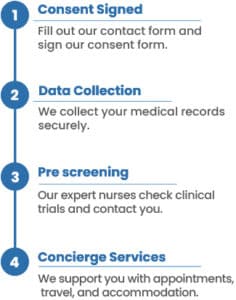News
Massive Bio Has Onboarded Over 120,000 Cancer Patients To Find Their Clinical Trial
Pushing Boundaries in Breast Cancer Clinical Trials
If you're facing breast cancer, our service is here to assist. We specialize in linking patients with the most recent clinical trials for advanced-stage breast cancer, including both locally advanced and metastatic cases. We simplify the process for you to discover and participate in groundbreaking trials, connecting you with the latest treatment opportunities. Our aim is to support you through this difficult period by facilitating access to the forefront of medical research and treatments, providing guidance and assistance every step of the way.
Compliant with

You can receive a guidebook with information about breast cancer by filling out the form.
The Latest Breakthroughs in Treatment Options for Breast Cancer
Our matching system pairs you with the latest clinical trials, offering new possibilities for individuals confronting breast cancer. You’ll find detailed information on clinical trials for all stages of breast cancer, such as Early (Stage I), Localized (Stage II), Locally Advanced (Stage III) and Metastatic (Stage 4) Breast Cancer. These trials introduce innovative treatment approaches that are not widely available, concentrating on the unique biomarkers associated with your specific type of breast cancer. This is an opportunity for you to take an active role in your treatment, with our support and guidance throughout the process.
Understanding the Disease
What is Breast Cancer?
Breast cancer is a type of cancer that forms in the cells of the breasts, making it one of the most common cancers diagnosed in women worldwide, though it can also occur in men. It begins when cells in the breast grow out of control and can form a tumor that is felt as a lump or seen on an x-ray. The exact cause of breast cancer is not fully understood, but a combination of genetic, environmental, and lifestyle factors are believed to contribute to its development.
Stages of Breast Cancer
Stage I Breast Cancer: Early-stage cancer where the tumor is small (up to 2 centimeters) and has limited or no lymph node involvement.
Stage II Breast Cancer: Cancer that is larger (2 to 5 centimeters or more) and/or has spread to nearby lymph nodes.
Stage III Breast Cancer: Locally advanced cancer with larger tumors that have spread to several lymph nodes or nearby tissues such as the chest wall or skin.
Stage IV Breast Cancer: Metastatic cancer that has spread beyond the breast and nearby lymph nodes to distant organs like the bones, liver, lungs, or brain.
Main signs and symptoms of breast cancer:
Lump in the Breast or Underarm: A lump that feels different from the rest of the breast tissue is one of the most common signs of breast cancer. It’s important to have any new lumps or changes in breast tissue checked by a healthcare professional.
Change in Size, Shape, or Appearance of a Breast: This can include unexplained changes in the size or shape of the breast, including swelling or shrinkage, especially if it’s only on one side.
Changes to the Skin Over the Breast: This can include dimpling, puckering, scaling, or redness of the skin on the breast.
Nipple Changes or Discharge: Changes such as the nipple turning inward or discharge from the nipple, especially if it’s bloody, can be a sign.
Breast Pain: While breast pain is more commonly associated with non-cancerous conditions, any persistent pain should be evaluated.
Peeling, Scaling, or Flaking of the Nipple or Breast Skin: Any crusting, flaking, or scaling of the skin on the nipple or breast may be a sign of breast cancer.
Redness or Pitting of the Skin Over Your Breast: The skin may appear red, purple, or slightly darker, and texture changes may make the skin look like the skin of an orange.
It’s important to note that these symptoms can also be caused by conditions that are not breast cancer. However, if you notice any of these signs or other changes in your breasts, it’s important to see a healthcare provider as soon as possible for evaluation. Early detection and treatment of breast cancer can significantly improve outcomes.
What does Treated and Untreated Breast Cancer Mean?
Treated Breast Cancer: Treated breast cancer has received medical interventions such as surgery, chemotherapy, radiation, hormone, or targeted therapy to manage and control the disease. Some clinical trials require prior treatment to ensure the cancer has been managed before testing new interventions.
Untreated Breast Cancer: Untreated breast cancer refers to cancer that has not received any form of oncologic treatment. This can apply to any stage of breast cancer, including early, localized, locally advanced, or metastatic stages. There are clinical trials specifically seeking patients who haven’t received systemic therapy or specific medications, making them ideal candidates for trials that require untreated patients.
No matter the case, there are clinical trials designed for both treated and untreated breast cancer patients, offering access to potentially groundbreaking therapies.
What Does Resectable (Surgery-Eligible) and Unresectable (Not Surgery-Eligible) Breast Cancer Mean?
Resectable Breast Cancer: Resectable breast cancer can be surgically removed, typically confined to the breast and nearby lymph nodes without distant spread. Surgical options include lumpectomy (removal of the tumor and some surrounding tissue) or mastectomy (removal of the entire breast), often followed by additional treatments. Clinical trials often seek patients with resectable breast cancer to evaluate adjuvant (additional cancer treatment given after the primary treatment, such as surgery) therapies.
Unresectable Breast Cancer: Unresectable breast cancer cannot be surgically removed due to its size, location, or spread, often representing advanced stages. Clinical trials for unresectable breast cancer focus on new systemic therapies, targeted therapies and different combinations of treatments.
What are the current treatment options for breast cancer?
The treatment options for breast cancer depend on the type of breast cancer, its stage, and other factors like the patient’s overall health and personal preferences. Treatments can be local, targeting the tumor without affecting the rest of the body, or systemic, which means they target cancer cells throughout the body. Here are the main treatment options for breast cancer:
Surgery
There are several types of surgery for breast cancer:
Lumpectomy: Removal of the tumor and a small margin of surrounding tissue, preserving most of the breast.
Mastectomy: Removal of one or both breasts, partially (segmental mastectomy) or completely (total mastectomy).
Radiation Therapy
This treatment uses high-energy waves to target and kill cancer cells. It’s often used after surgery to eliminate any remaining cancer cells in the breast, chest wall, or axilla (underarm area). This is usually used in locally advanced breast cancer.
Chemotherapy
Chemotherapy uses drugs to kill cancer cells, usually administered intravenously or orally. It can be given before surgery (neoadjuvant chemotherapy) to shrink a tumor or after surgery (adjuvant chemotherapy) to kill any remaining cancer cells. This is usually used in metastatic breast cancer.
Hormone Therapy (Endocrine Therapy)
For cancers that are hormone receptor-positive, hormone therapy can help slow or stop the growth of cancer cells. Medications like tamoxifen (for premenopausal and postmenopausal women) and aromatase inhibitors (for postmenopausal women) are commonly used.
Targeted Therapy for Breast Cancer
This approach uses drugs or other substances to precisely identify and attack cancer cells, usually while doing little damage to normal cells. Targeted therapy is often used for cancers that have specific genetic markers, such as HER2-positive breast cancer.
Immunotherapy
Immunotherapy helps the immune system fight cancer by boosting the body’s natural defenses to detect and destroy cancer cells. It’s more commonly used for triple-negative breast cancer that is locally advanced or metastatic.
Bone-directed Therapy
For patients whose breast cancer has spread to the bone, this treatment helps protect the bones against the effects of cancer.
NGS Testing and Clinical Trials
Next-Generation Sequencing (NGS) allows for the detailed analysis of a wide range of biomarkers in breast cancer, which can guide personalized treatment strategies. Some of the key biomarkers that can be identified using NGS in breast cancer include:
Hormone Receptors (Estrogen Receptor (ER) and Progesterone Receptor (PR)): NGS can identify mutations in the genes that encode these receptors, providing insights into the tumor’s hormone responsiveness.
HER2 (ERBB2): NGS can detect amplifications or mutations in the ERBB2 gene, which encodes the HER2 protein, guiding the use of HER2-targeted therapies.
PIK3CA: Mutations in the PIK3CA gene, which encodes a subunit of PI3K, are common in breast cancer and can affect responses to certain treatments, including hormone therapy and PI3K inhibitors.
TP53: TP53 is a tumor suppressor gene, and mutations in TP53 are associated with various cancers, including breast cancer, affecting tumor behavior and treatment response.
BRCA1 and BRCA2: NGS testing can identify germline and somatic mutations in these genes, which are linked to an increased risk of breast and ovarian cancers. This information is crucial for risk assessment and deciding on preventive strategies or treatments, such as PARP inhibitors.
AKT1: Mutations in AKT1 are found in a subset of breast cancers and can influence responses to specific targeted therapies.
ESR1: Mutations in the ESR1 gene, which encodes the estrogen receptor, are associated with resistance to aromatase inhibitors, a common hormone therapy for breast cancer.
The link between Next-Generation Sequencing (NGS) and clinical trials for breast cancer is very important and complex. It helps push forward personalized medicine and the creation of treatments aimed at specific cancer characteristics.
Immunohistochemistry (IHC) testing and Clinical Trials:
Immunohistochemistry (IHC) is essential in breast cancer care for identifying key markers (antigens) in tissue samples. This technique ensures treatments are precisely tailored to the tumor’s specific biomarkers, guiding therapy choices across different treatment stages and facilitating the development of new treatments in clinical trials. Ultimately, IHC enhances patient outcomes in breast cancer management by ensuring targeted and effective therapeutic approaches. Some of the key biomarkers that can be identified using IHC in breast cancer include:
Estrogen Receptor (ER): Indicates the presence of estrogen receptors on cancer cells, suggesting potential responsiveness to hormone therapy. ER-positive cancers generally have a better prognosis.
Progesterone Receptor (PR): Similar to ER, the presence of progesterone receptors can indicate a likelihood of response to hormone therapy. PR status is usually reported alongside ER.
Human Epidermal Growth Factor Receptor 2 (HER2): HER2 it is a protein that promotes cell growth of cancer cells. HER2-positive cancers can be more aggressive but are treatable with targeted therapies.
Ki-67: Is a useful marker of cell proliferation. High Ki-67 levels indicate rapid cancer cell division, suggesting a more aggressive tumor.
PD-L1 (Programmed Death Ligand 1): An important marker for immunotherapy potential, particularly in Triple Negative Breast Cancer (TNBC). PD-L1 expression can indicate a tumor’s potential response to immunotherapeutic drugs that block the PD-1/PD-L1 pathway, enhancing immune response against the tumor.
Breast Cancer Subtypes Based on IHC
Hormone Receptor-Positive (HR+): Hormone receptor-positive breast cancer cells grow in response to hormones such as estrogen and progesterone. This subtype includes:
- Estrogen Receptor-Positive (ER+): Cancer cells that grow in response to estrogen.
- Progesterone Receptor-Positive (PR+): Cancer cells that grow in response to progesterone.
HER2-Positive: HER2-positive breast cancer cells have high levels of the HER2 protein, which promotes cancer cell growth. This subtype is more aggressive than hormone receptor-positive cancers but can be treated effectively with targeted therapies.
Triple Negative Breast Cancer (TNBC): Triple negative breast cancer (TNBC) is a type of breast cancer that lacks three common receptors: estrogen receptor (ER), progesterone receptor (PR), and human epidermal growth factor receptor 2 (HER2). These IHC biomarkers are used to classify breast cancer, and due to the lack of these receptors, endocrine therapies and HER2-targeted treatments are not effective. TNBC is known for being more aggressive and having a poorer prognosis compared to other breast cancer types. However, if you have TNBC, there are numerous clinical trials available specifically for this classification. These trials accept patients at any stage, including early localized, locally advanced, and metastatic TNBC, offering access to innovative treatments tailored to this aggressive subtype.
No matter the subtype, there are clinical trials tailored to each type of breast cancer, offering patients access to the most innovative clinical trials.
The Role of Breast Cancer Clinical Trials
Clinical trials play a crucial role in the advancement of breast cancer treatment, offering patients access to new therapies and interventions before they are widely available. These trials are research studies that test the safety and effectiveness of new treatment approaches, medications, therapies, or combinations thereof to determine whether they should become the standard of care for breast cancer treatment. Participation in a clinical trial can provide several benefits:
Benefits of Clinical Trials
Access to New Treatments: Participants can access cutting-edge treatments that are not available outside the clinical trial setting.
Contribution to Research: By participating in clinical trials, individuals contribute to medical research that could improve cancer treatment for future patients.
Close Monitoring: Participants in clinical trials receive very close medical monitoring related to their treatment and overall health.
Types of Clinical Trials for Breast Cancer
Clinical trials for breast cancer can include:
Prevention Trials: Aimed at finding better ways to prevent breast cancer in people who have never had it or to prevent the cancer from returning.
Screening Trials: Focus on finding new ways to detect breast cancer early, when it may be more treatable.
Treatment Trials: Test new treatments, new combinations of treatments, or new approaches to surgery or radiation therapy.
Quality of Life Trials (Supportive Care): Explore ways to improve comfort and quality of life for breast cancer patients.
We combine the power of technology with our dedicated team of medical providers to find you the best treatment options available.
Access the free matching toolHow Massive Bio Helps Patients With Breast Cancer
Massive Bio offers a quick, easy, and free way to find clinical trials for patients like you. With our unique clinical trial matching system and compassionate team, Massive Bio can rapidly match you to clinical trials of new therapies. If you aren’t sure what form of breast cancer you have, that’s okay. Additional testing can help determine your exact diagnosis.
Talk to us. Our nurses and patient relations coordinators are here and happy to help you. You are not alone in this fight.
Call +1 844 627 7246What is a Breast Cancer clinical trial?
Clinical trials test the latest scientific advancements in Breast Cancer treatment. Patients who choose to enroll in trials can receive cutting-edge treatment and high-quality care under the direction of scientists, doctors, and researchers. Breast cancer patients might gain access to promising drugs and innovative treatments long before they're made available to the public.

You are not alone
You can have an experienced team with you
What Are Clinical Trials?
Cancer is an unfortunate reality that touches most of us at some point in our lives. If you or a loved one has cancer, you may have heard or read that clinical trials could offer access to innovative new treatments. But what exactly is a clinical trial? In this video, Massive Bio co-founder Arturo Loaiza-Bonilla, MD, explains how clinical trials work, what to expect if you enroll in one, and why a clinical trial can be an important treatment option for many cancer patients.
We dream of the day when cancer disappears from our lives. Massive Bio is working tirelessly on achieving that goal.










Massive Bio has gone above and beyond to connect my family with the right care during Covid-19. I really appreciate their staff’s consistent and clear outreach during this process.
I reached out to Massive Bio after learning of a recent breast cancer diagnosis of a family member. From free expert clinical trial matching to patient relations coordinator support, Massive Bio was able to provide me with the necessary resources and knowledge to provide my family member the support they needed during their cancer journey.
I have recommended this to colleagues for patients that could benefit from clinical trials or have exhausted their treatment options and need a second opinion. Massive Bio’s team puts great minds together to find better solutions for patients that might think they have none left.
When my sister in-law was diagnosed with breast cancer, she did not have a good understanding of her options. I reached out to Massive Bio for help. Her assigned case resource and patient relations coordinators quickly got in touch with her getting her diagnosis from her doctors, and providing options including clinical trials. The service Massive Bio provided was excellent, and made me realize how important to have a company like Massive Bio on your side when someone you know is fighting cancer.
We reached out to Massive Bio for a second opinion regarding my Mothers breast cancer diagnosis. Massive Bio provided us with alternative treatment options which were clinically proven to be more effective and with less side effects than the standard level of care our oncologist suggested. Their team was quick to respond, extremely knowledgeable, answered all of our questions. They continue to follow her case, gladly reviewing any new scans and results. We are so grateful for the time and effort they continue to put into her case. Thank you Massive Bio for giving us hope again!
Massive Bio’s team is amazing. They work tirelessly to help patients and providers. This company truly cares about the work they are doing and the care they are delivering.